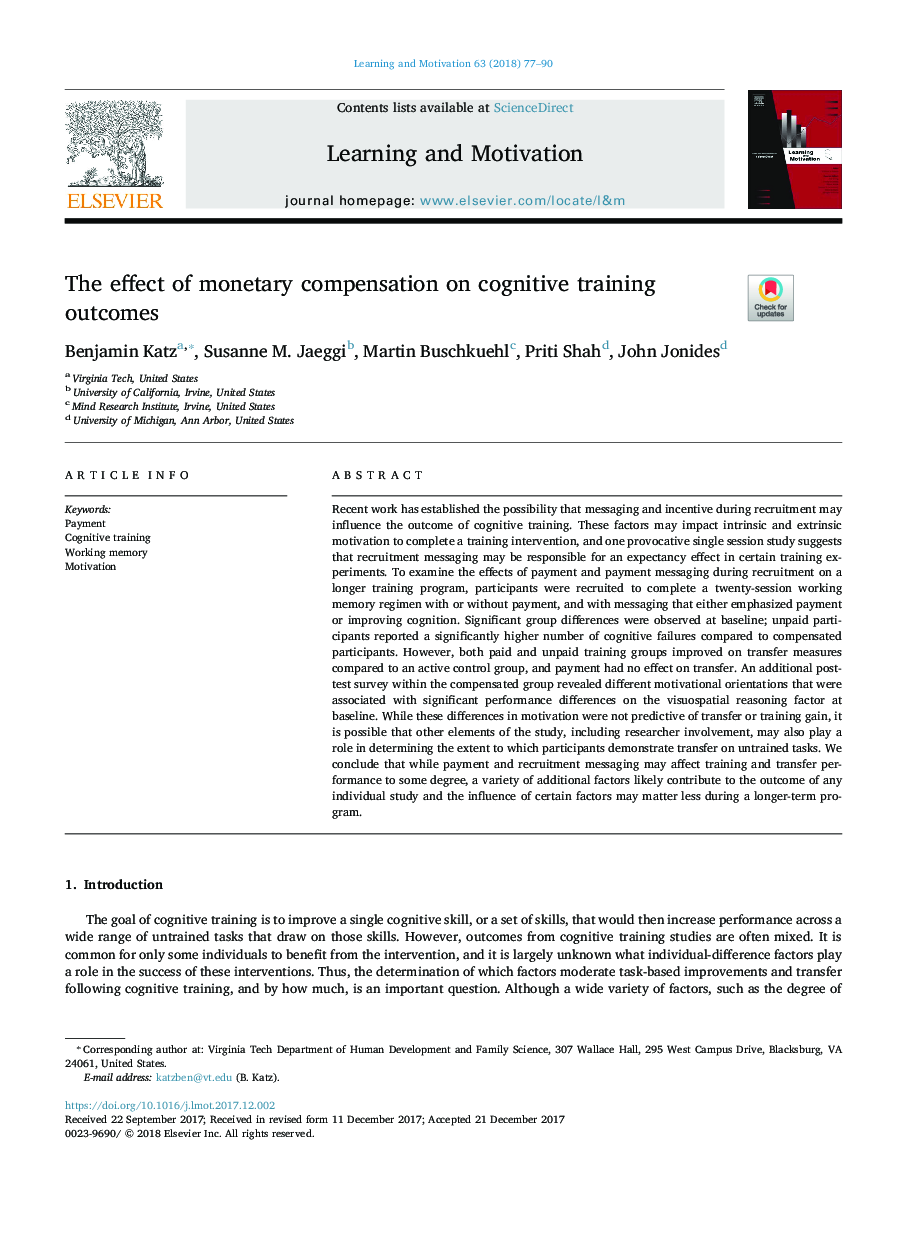| کد مقاله | کد نشریه | سال انتشار | مقاله انگلیسی | نسخه تمام متن |
|---|---|---|---|---|
| 7275690 | 1473505 | 2018 | 14 صفحه PDF | دانلود رایگان |
عنوان انگلیسی مقاله ISI
The effect of monetary compensation on cognitive training outcomes
ترجمه فارسی عنوان
اثر غرامت پولی بر نتایج آموزشی شناختی
دانلود مقاله + سفارش ترجمه
دانلود مقاله ISI انگلیسی
رایگان برای ایرانیان
کلمات کلیدی
پرداخت، آموزش شناختی، حافظه کاری، انگیزه،
ترجمه چکیده
کار اخیر این امکان را ایجاد کرده است که پیام رسانی و انگیزه در هنگام استخدام ممکن است بر نتیجه آموزش های شناختی تأثیر بگذارد. این عوامل ممکن است انگیزه ذاتی و بیرونی برای تکمیل مداخله آموزشی را تحت تاثیر قرار دهند و یک بررسی یک جلسه تحریک آمیز نشان می دهد که پیام های استخدام ممکن است مسئولیت تأثیر انتظارات در برخی آزمایش های آموزشی را داشته باشند. برای بررسی تأثیر پیام های پرداخت و پرداخت در هنگام استخدام در یک برنامه آموزشی طولانی، شرکت کنندگان برای تکمیل رژیم حافظه کاری بیست جلسه با پرداخت یا بدون پرداخت پول و یا پیام رسانی که یا بر پرداخت یا بهبود شناخت تأکید داشتند، استخدام شدند. تفاوت های گروهی معنی دار در ابتدایی مشاهده شد. شرکت کنندگان بدون پرداخت هزینه های شناختی بیشتری نسبت به شرکت کنندگان جبران شده گزارش دادند. با این حال، هر دو گروه آموزش پرداخت شده و بدون پرداخت هزینه های انتقال در مقایسه با گروه کنترل فعال بهبود یافته و پرداخت بر روی انتقال تأثیری نداشت. یک بررسی اضافی پس آزمون در گروه جبران شده نشان داد که جهت گیری های انگیزشی مختلفی وجود دارد که با تفاوت های عملکرد قابل توجهی در فاکتور استدلال فضایی در ابتدای رابطه وجود دارد. در حالی که این تفاوت در انگیزه پیش بینی انتقال و یا افزایش آموزش نیست، ممکن است که سایر عناصر مطالعه، از جمله درگیر شدن محققان، همچنین در تعیین میزان شرکت کنندگان نشان دهنده انتقال به وظایف غیر تمرین باشد. ما نتیجه می گیریم که در حالی که پیام های پرداختی و استخدامی ممکن است تا حدودی بر عملکرد آموزش و انتقال تاثیر بگذارد، انواع عوامل اضافی به احتمال زیاد در نتیجه هر مطالعه فردی تاثیر می گذارند و تاثیر برخی عوامل در طول یک برنامه بلند مدت ممکن است کمتر باشد.
موضوعات مرتبط
علوم زیستی و بیوفناوری
علم عصب شناسی
علوم اعصاب رفتاری
چکیده انگلیسی
Recent work has established the possibility that messaging and incentive during recruitment may influence the outcome of cognitive training. These factors may impact intrinsic and extrinsic motivation to complete a training intervention, and one provocative single session study suggests that recruitment messaging may be responsible for an expectancy effect in certain training experiments. To examine the effects of payment and payment messaging during recruitment on a longer training program, participants were recruited to complete a twenty-session working memory regimen with or without payment, and with messaging that either emphasized payment or improving cognition. Significant group differences were observed at baseline; unpaid participants reported a significantly higher number of cognitive failures compared to compensated participants. However, both paid and unpaid training groups improved on transfer measures compared to an active control group, and payment had no effect on transfer. An additional post-test survey within the compensated group revealed different motivational orientations that were associated with significant performance differences on the visuospatial reasoning factor at baseline. While these differences in motivation were not predictive of transfer or training gain, it is possible that other elements of the study, including researcher involvement, may also play a role in determining the extent to which participants demonstrate transfer on untrained tasks. We conclude that while payment and recruitment messaging may affect training and transfer performance to some degree, a variety of additional factors likely contribute to the outcome of any individual study and the influence of certain factors may matter less during a longer-term program.
ناشر
Database: Elsevier - ScienceDirect (ساینس دایرکت)
Journal: Learning and Motivation - Volume 63, August 2018, Pages 77-90
Journal: Learning and Motivation - Volume 63, August 2018, Pages 77-90
نویسندگان
Benjamin Katz, Susanne M. Jaeggi, Martin Buschkuehl, Priti Shah, John Jonides,
